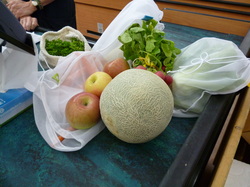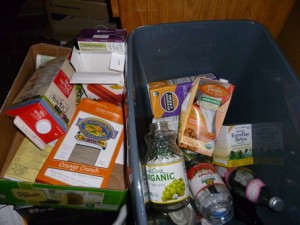 On the cusp of spring, here in the high mountains of Colorado, I found myself embroiled in the weekly battle that my husband typically oversees: Recycling. I was appalled. We are environmentalists. We eat organic food. We buy local. We do, what we thought, was our best to eat and live responsibly given the constraints of the culture that we live in. But here I was, up against that unspoken behemoth of wastefulness: food packaging.
On the cusp of spring, here in the high mountains of Colorado, I found myself embroiled in the weekly battle that my husband typically oversees: Recycling. I was appalled. We are environmentalists. We eat organic food. We buy local. We do, what we thought, was our best to eat and live responsibly given the constraints of the culture that we live in. But here I was, up against that unspoken behemoth of wastefulness: food packaging.
I decided then and there to embark on a 30-day adventure without packaged food. I convinced my husband to join me, cleaned out the cupboards, grabbed some tote bags and Tupperware, and headed to the farmers markets, the grocery stores and whatever farm stands I could find.
 One of the rules was that plastic bags were banned. Instead, I had to bring my own containers from home and shop in the bulk and bakery sections. I discovered that you can bring your containers to the cashier at Whole Foods and have them weighed. They will write the tare weight on the container and then at checkout, you will not be charged for the weight of the container. I proudly filled my pre-weighed containers with meats from the meat counter and oils and sauces from the bulk section. I also brought smaller produce bags for fruits and veggies, fresh bakes loaves of bread, coffee, rice, beans and dried fruits. The trick is, making sure you bring enough bags and containers!
One of the rules was that plastic bags were banned. Instead, I had to bring my own containers from home and shop in the bulk and bakery sections. I discovered that you can bring your containers to the cashier at Whole Foods and have them weighed. They will write the tare weight on the container and then at checkout, you will not be charged for the weight of the container. I proudly filled my pre-weighed containers with meats from the meat counter and oils and sauces from the bulk section. I also brought smaller produce bags for fruits and veggies, fresh bakes loaves of bread, coffee, rice, beans and dried fruits. The trick is, making sure you bring enough bags and containers!
At times, I found it difficult to be out and about and not be able to stop by and pick up a grocery store sushi in a disposable clam-shell, or a drink or some snack. I probably lost a little weight the first week, but finally figured out how to plan and shop and cook ahead of time.
What I realized is that we live in luxurious times. Everything is accessible, and yet, in the midst of the toxic packaged lifestyle, we forget what real luxury is. This little experience was not only pretty easy, given how available organic and local unpackaged food is today, it was also entirely luxurious. I felt nourished, not only from the daily juicer, but from participating in a way of life that felt more real, less destructive, more rejuvenating.
Read the complete blog here. Here were my thoughts on day-30.
Day-30: Someone Feed Me – Please!
On Day-30, I have to ask myself, would I rather TALK about sustainability, or would I rather LIVE it? I have to wonder, is it possible to be green, truly green, and still be part of society – and if not, which would I choose?
I’ve never wanted to be an outsider – to live super green, but wholly outside of the culture that I was raised in. I like people. I like pop culture. I like being part of the zeitgeist, of the pulse of things. I like art, and politics, and vacations, and playing outside, and having friends and hanging out, and taking showers, and wearing cute clothes, and eating out.
 Even so, it sickens me to see the disposable culture that has been built up around our lives. There is massive debate around the issue of what sustainability means. When I define sustainability, I don’t necessarily see it as me being personally responsible for meeting all of my needs – although, sometimes, I do. I think a better approach is to allow sustainability to take on a community meaning – a reliance on other trustworthy people and business to care for each others health and needs. Sustainability in this way, is not about each person or family living in recluse and being responsible for all of its own food, shelter and other needs. Rather, sustainability is about living in a culture that provides for the health and stability of the people and at the same time rejuvenates the planet’s natural systems. Whereas during the last 30-days, I have felt somewhat outside of things, living in a CULTURE and community is the key.
Even so, it sickens me to see the disposable culture that has been built up around our lives. There is massive debate around the issue of what sustainability means. When I define sustainability, I don’t necessarily see it as me being personally responsible for meeting all of my needs – although, sometimes, I do. I think a better approach is to allow sustainability to take on a community meaning – a reliance on other trustworthy people and business to care for each others health and needs. Sustainability in this way, is not about each person or family living in recluse and being responsible for all of its own food, shelter and other needs. Rather, sustainability is about living in a culture that provides for the health and stability of the people and at the same time rejuvenates the planet’s natural systems. Whereas during the last 30-days, I have felt somewhat outside of things, living in a CULTURE and community is the key.
Our current cultural and food systems systematically destroy both the health of the people and the earth’s ecosystems. This is fundamentally where the problem resides: In the cultural view of the human role on earth.
As a Backyard Agrarian, I want to live in a culture that is not so destructive and in which I can live and find healthy choices wherever I look. I don’t want to have to live my life shunning the culture and practices around me. I want instead, for the society, the farming practices, the manufacturing practices, the building norms, and the habits of the people, to rise up to meet me and to meet all of the other people who are trying day-by-day-by-day to live more ecologically appropriate, healthy, happy lives that at the same time help improve the planet upon which we were born and on which we rely for every facet of life from beauty to sustenance.
I guess what I want is for the culture to shift away from the blind destruction, and towards an understanding that we are big. That we humans are big – together – our culture has a massive impact on this precious world, and our experience in it. I want our culture to recognize that when we poison our food growing in the fields, when we spend our free time battling traffic, we are living in a culture that doesn’t have to be this way – that can be better. I want our culture to recognize that when we go on a weekend getaway to somewhere beautiful, but we spend the weekend drinking out of plastic cups and gratuitously burning gasoline in recreational vehicles, we are ruining that very world we are trying to appreciate.
The truth is, we are so deeply into this toxic manufacturing culture, that it is difficult to avoid it. Even going 30-days without packaged foods, I cooked my food with coal-powered electricity. I drove to the store or the farms to buy the unpackaged food in my car fueled by oil that has caused climate change and other horrors like the destruction of the Niger Delta and a decade of war in the Middle East.
So, after 30-days of avoiding packaged food, here’s what to have to say: I don’t want to do it alone. It’s no fun to do it alone, and also, it won’t work if only some of us hippies and hipster foodies do it just us. I 100% support stopping by that organic farm stand and supporting that step towards the transformation – towards local sustainable food systems. As more of us do it, we will see more options, but farmland is expensive and developers will pay a high price for it – so how far can this really take us?
They say the American Dream is dead, that we will no longer live better lives than our parents, that kids will grow up sicker than their parents and make less money. The health implications are devastating, but there’s an opening here. If the white picket fence 1950s consumer model of the American Dream is dead, maybe it’s time to develop a new one – A New American Dream where we don’t value growth at all costs, where instead we value the things that really matter.
Like the resurgence of Bossa Nova music, maybe we will get a little classier, get a little more in tune with what the world is asking and begging of us. Maybe after so much time on the convenience bandwagon, perhaps we can use that free time to see more clearly, to look into the world and see what needs to be done. Maybe all convenience all the time, isn’t really the way. Maybe we pick and choose. Maybe I carry containers with me wherever I go and use them for take-out. Maybe I participate in modern society – but tweek it a little. Maybe our public policies could have some rational vision for a future that involves continued life on planet earth, rather than hand-outs to the biggest most destructive companies that have ever existed.
After 30-days of no packaged food, I have realized that I can do a lot better in my own personal habits. I can personally have a much improved impact. I have also realized that I don’t want to give up all of the benefits of civilization. That said, the culture of my home has been transformed. I predict this experiment will live on and we will continue to buy whatever we can buy without packaging. We both look forward to more meals out, more snacks away from home, more bottles of wine or cans of beer, but the rules have changed. There’s no doubt about that, and in this culture where anything and everything goes, the guy with the biggest toys wins, and all that, I think some self-imposed rules to bring about and maintain some level of sanity and rational behavior, some rules of engagement with this world, some redefining of possibility, some narrowing of choice, some rules that say, “This is how I live” are certainly a good thing.
Liz Brown Morgan is a wilderness guide, turned environmentalist, turned water lawyer, turned tax lawyer turned Agrarian Revolutionary. Liz is the founder of Backyard Agrarian through which she writes about the requisite Agrarian Revolution and the Landscape Imperative needed to save ourselves – from ourselves. Liz is a yogi, a wild gardener, a telemark skier, a rafter, an eco-entrepreneur and a community activist. She lives in the foothills of the Rocky Mountains just outside of Boulder, Colorado.
Kudos to Liz for this project and for her inspiring and eye-opening blog! If you want to join in and try one week free of packaged food, be sure to check out Liz’s project on earthbongo: http://earthbongo.com/project/263/backyard-agrarians-7-days-without-packaged-food